Access keys
Search Skip navigation
Publications
MoLeNET and LSN Technology Enhanced Learning Research Centre m-learning publications
Work-based and vocational mobile learning - Making IT work
Summary: This publication includes more than 40 case studies focusing on the use of mobile technologies in the context of work-based and vocational learning. The projects that generated these case studies were part of years one(2007/08) and two (2008/09) of the MoLeNET initiative.
Download Copy
Modernising education and training : Mobilising technology for learning
Summary: In recent years there have been amazing advances in consumer technology. The Mobile Learning Network (MoLeNET) initiative has enabled colleges and schools to harness some of this technology in order to modernise aspects of teaching, learning and training. The result has been improvements in learner engagement, retention, achievement and satisfaction. This publication draws on the experiences of the 11,253 learners and 2261 teachers involved in the 2nd year of MoLeNET. It also reports the findings of research which sought evidence of the impact of introducing handheld and wireless technologies for learning. This evidence has been collected and analysed by LSN Technology Enhanced Learning Research Centre researchers and by practitioner researchers trained and supported by LSN.
Download Copy
Games technologies for learning : More than just toys
Summary: Many MoLeNET projects have utilised games technologies, including handheld, Sony PSPs and Nintendo DSs and the Nintendo Wii, to support teaching and learning. This publication explores the benefits of game based learning and the additional functionality offered by games technologies. Thirty five case studies and snapshots from MoLeNET projects illustrate the ways in which teachers and learners have used games technologies, both inside and outside of the classroom, and describe the benefits realised.
Download Copy
The Impact of Mobile Learning: Examining what it means for teaching and learning
Summary:
Phase one of MoLeNET (2007/08) involved 75 colleges and 18 schools, approximately 10,000 learners and 2,000 staff, in 32mobile learning projects. The Learning and Skills Council provided funding for handheld technologies and supporting infrastructure. The LSN MoLeNET Support programme provided advice and guidance; systems and materials; face-to-face, on-line and on-site training and continuing professional development; on-line support including peer-to-peer support and knowledge and resource sharing. LSN research, and LSN supported practitioner-led action research, explored the impact of introducing mobile learning on learner retention and achievement, teaching and learning, learner experiences and participating institutions. The findings of the research are described in this publication.
GoMobile! Maximising the potential of mobile technologies for learners with disablilities
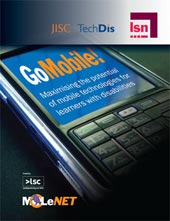 Summary: Across the sectors, practitioners are dealing with increasingly diverse learner needs, but there are limits to how effectively traditional teaching and learning methods can engage, support and stretch learners who have markedly different starting points and accessibility needs. Mobile learning offers some innovative and effective ways of tackling this challenge, but is still perceived by many as a niche area reserved for those with advanced technical skills. When mobile technologies have made their way into learning and teaching, it is often assumed that their benefits do not extend to learners with disabilities. But is that true? In what ways might learners benefit from working with mobile technologies? What are the problems and where are the quick wins? Drawing on the experiences of those working in the vanguard of mobile learning and inclusivity in independent specialist colleges and further and higher education institutions, GoMobile! Maximising the potential of mobile technologies for learners with disabilities passes on some of the lessons learnt to make mobile learning a more achievable aim for those working with learners with disabilities. Drawing on outcomes emerging from initiatives such as the Learning and Skills Council's MoLeNET and Learning for Living and Work (L4LW) programmes, and the Higher Education Assistive Technologies (HEAT) scheme administered by the JISCTechDis , GoMobile! explores how mobile technologies can make day-to-day living and learning more manageable, enjoyable and achievable for learners who face a range of challenges when learning.
Summary: Across the sectors, practitioners are dealing with increasingly diverse learner needs, but there are limits to how effectively traditional teaching and learning methods can engage, support and stretch learners who have markedly different starting points and accessibility needs. Mobile learning offers some innovative and effective ways of tackling this challenge, but is still perceived by many as a niche area reserved for those with advanced technical skills. When mobile technologies have made their way into learning and teaching, it is often assumed that their benefits do not extend to learners with disabilities. But is that true? In what ways might learners benefit from working with mobile technologies? What are the problems and where are the quick wins? Drawing on the experiences of those working in the vanguard of mobile learning and inclusivity in independent specialist colleges and further and higher education institutions, GoMobile! Maximising the potential of mobile technologies for learners with disabilities passes on some of the lessons learnt to make mobile learning a more achievable aim for those working with learners with disabilities. Drawing on outcomes emerging from initiatives such as the Learning and Skills Council's MoLeNET and Learning for Living and Work (L4LW) programmes, and the Higher Education Assistive Technologies (HEAT) scheme administered by the JISCTechDis , GoMobile! explores how mobile technologies can make day-to-day living and learning more manageable, enjoyable and achievable for learners who face a range of challenges when learning.
Download publication
Mobile learning in practice: Piloting a mobile learning teachers' toolkit in further education colleges
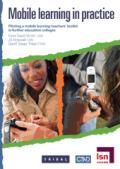 UK college tutors taking part in the Mobile Learning Teachers' Toolkit project authored their own mobile learning materials (SMS quizzes, PDA learning games and mediaBoard activities) to cater for the specific needs of their students in their particular context. This publication reports on the impact of these mobile learning activities on teaching, learning and students' interest in learning and on how tutors integrated mobile learning into the curriculum. The challenges of setting up the project and some lessons learned are also discussed. Examples of the learning materials created and tips for using these tools with students are included to inform teachers who may be considering mobile learning for their students.
UK college tutors taking part in the Mobile Learning Teachers' Toolkit project authored their own mobile learning materials (SMS quizzes, PDA learning games and mediaBoard activities) to cater for the specific needs of their students in their particular context. This publication reports on the impact of these mobile learning activities on teaching, learning and students' interest in learning and on how tutors integrated mobile learning into the curriculum. The challenges of setting up the project and some lessons learned are also discussed. Examples of the learning materials created and tips for using these tools with students are included to inform teachers who may be considering mobile learning for their students.
Download publication
Mobile technologies and learning: a technology update and m-learning project summary
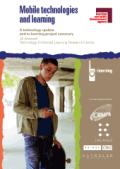 The use of mobile technologies to support, enhance and improve access to learning is a relatively new idea and while many teenagers and twenty-somethings are expert mobile phone users many educators are not. This publication provides a quick, plain English introduction to mobile phone technology and summarises the work and findings of the m-learning research and development project. This project investigated the potential of mobile devices for taking learning to young adults with literacy and/or numeracy difficulties.
The use of mobile technologies to support, enhance and improve access to learning is a relatively new idea and while many teenagers and twenty-somethings are expert mobile phone users many educators are not. This publication provides a quick, plain English introduction to mobile phone technology and summarises the work and findings of the m-learning research and development project. This project investigated the potential of mobile devices for taking learning to young adults with literacy and/or numeracy difficulties.
Download publication
Mobile learning anytime everywhere
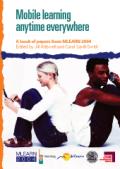 The third annual international mobile learning conference MLEARN 2004 was organised by the MOBIlearn and m-learning projects. The main of the conference was to bring together people interested in developing opportunities, systems and content for learning with mobile and wireless devices and networks as well as researchers and educationalists with an interest in mobile learning. The interesting and varied papers in this edited book are based on presentations given at MLEARN2004 and they provide a flavour of current achievements and work-in-progress in the field of mobile learning. Please be aware that this document has a file size of 2.9 MB and would take a considerable amount of time to download on a dial up connection!
The third annual international mobile learning conference MLEARN 2004 was organised by the MOBIlearn and m-learning projects. The main of the conference was to bring together people interested in developing opportunities, systems and content for learning with mobile and wireless devices and networks as well as researchers and educationalists with an interest in mobile learning. The interesting and varied papers in this edited book are based on presentations given at MLEARN2004 and they provide a flavour of current achievements and work-in-progress in the field of mobile learning. Please be aware that this document has a file size of 2.9 MB and would take a considerable amount of time to download on a dial up connection!
Download publication
Learning with mobile devices : research and development - a book of papers
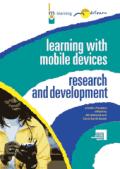 The authors who have contributed articles to this book are researchers, developers and practitioners in both educational and commercial organisations from a number of different countries. They all have in common an interest in the new and quickly evolving field of mobile learning. The papers are based on presentations given at MLEARN 2003 , which was hosted by LSDA in London in May 2003.
The authors who have contributed articles to this book are researchers, developers and practitioners in both educational and commercial organisations from a number of different countries. They all have in common an interest in the new and quickly evolving field of mobile learning. The papers are based on presentations given at MLEARN 2003 , which was hosted by LSDA in London in May 2003.
Download publication
The use of palmtop computers for learning - A review of the literature
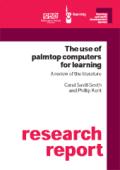 This research report is the result of a literature review conducted by LSDA during the m-learning project. The focus is on research involving the use of palmtop computers for learning. We carried out this review to inform the design and development of mobile learning materials and systems within the project. However the report highlights many interesting pedagogic and technical issues, which makes it a useful reference for teachers, trainers, developers, researchers and others interested in m-learning.
This research report is the result of a literature review conducted by LSDA during the m-learning project. The focus is on research involving the use of palmtop computers for learning. We carried out this review to inform the design and development of mobile learning materials and systems within the project. However the report highlights many interesting pedagogic and technical issues, which makes it a useful reference for teachers, trainers, developers, researchers and others interested in m-learning.
Download publication
Other mobile learning publications
Innovative Practice with e-Learning - JISC
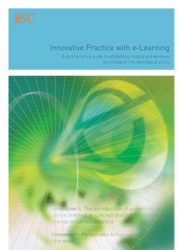 This is a short and well illustrated effective practice guide for managers and practitioners on the theme of embedding mobile and wireless technologies into everyday practice. Published under the Innovation strand of the JISC e-Learning Programme, it illustrates the potential benefits and challenges of mobile technologies from three perspectives: the learner, the practitioner and the institution, using case studies from the FE and HE sectors.
This is a short and well illustrated effective practice guide for managers and practitioners on the theme of embedding mobile and wireless technologies into everyday practice. Published under the Innovation strand of the JISC e-Learning Programme, it illustrates the potential benefits and challenges of mobile technologies from three perspectives: the learner, the practitioner and the institution, using case studies from the FE and HE sectors.
The publication comes with some valuable resources on a CD-ROM for staff development purposes. These include downloadable Word documents of the case studies, video clips for five of the case studies, an e-learning audit tool for managers, and planning tools for practitioners aiming to introduce mobile and wireless technologies into their practice.
The resource can be downloaded from
http://www.jisc.ac.uk/whatwedo/programmes/elearning_innovation/eli_practice.aspx or contact JISC for copies
Handheld Technologies for Mobile Learning – NIACE
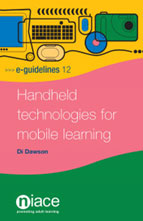 Mobile phones, MP3 players and Personal Digital Assistants (PDAs) are increasingly becoming a part of every day life. This book explores the potential of these devices to improve and enhance the educational experiences of adult learners. It takes the reader through many of the functions that are now available while we are on the move and relates these to the potential educational benefits.
Mobile phones, MP3 players and Personal Digital Assistants (PDAs) are increasingly becoming a part of every day life. This book explores the potential of these devices to improve and enhance the educational experiences of adult learners. It takes the reader through many of the functions that are now available while we are on the move and relates these to the potential educational benefits.
This publication can be downloaded from:
http://www.niace.org.uk/publications/H/handheld.asp
Mobile Learning: A Handbook For Educators and Trainers, Agnes Kukulska-Hulme and John Traxler (Editors)
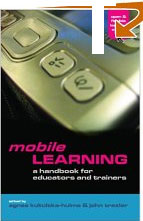 Emphasising the issues of usability, accessibility, evaluation and effectiveness and illustrated by case studies drawn from contemporary projects from around the world, this book considers:
Emphasising the issues of usability, accessibility, evaluation and effectiveness and illustrated by case studies drawn from contemporary projects from around the world, this book considers:
- the fundamentals of mobile technologies and devices
- the educational foundations of modern networked learning
- the issues that underpin mobile learning and make it accessible for all users
- the challenges of making mobile learning a substantial and sustainable component in colleges, universities and corporations
- implications and issues for the future.
This publication is available from the publisher (www.routledge.com), Amazon.co.uk and bookshops.
 | Other Publication Feeds
| Other Publication Feeds
Materials
Show all materials for this page